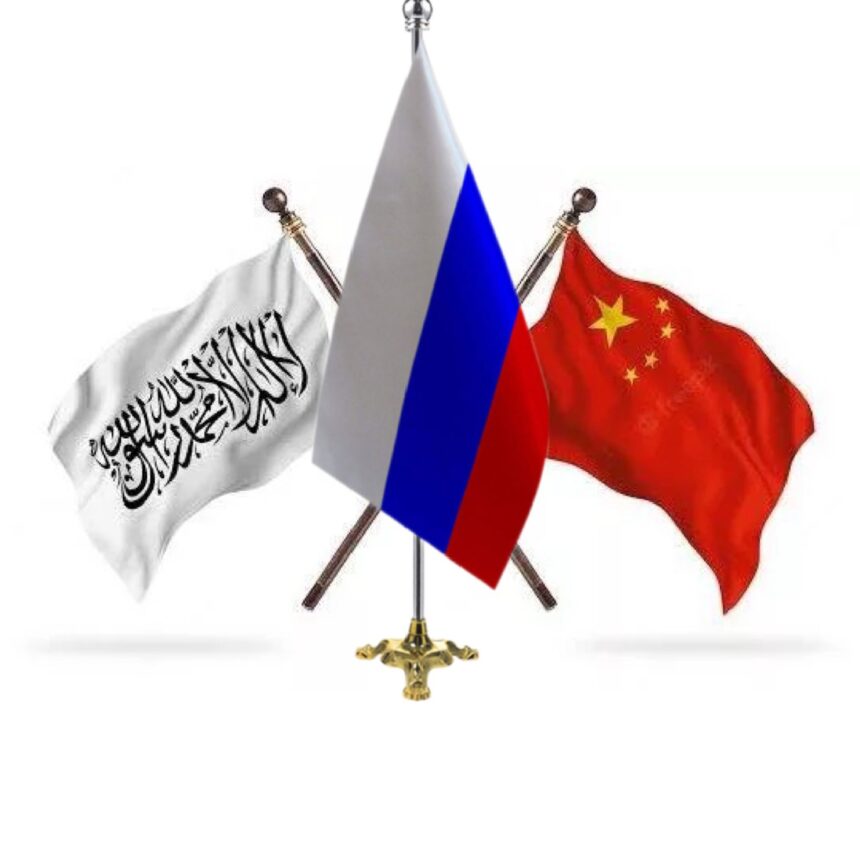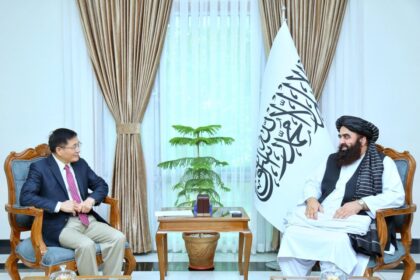RASC News Agency: Following the abrupt and chaotic withdrawal of U.S. forces from Afghanistan, global powers China and Russia have intensified their race to assert strategic dominance over the war-torn country. This competition is unfolding against the backdrop of Taliban rule a regime characterized by repression, incompetence, and the systematic dismantling of state institutions. Far from serving as a stabilizing force, the Taliban have rendered Afghanistan a fertile ground for external manipulation, transforming it into a silent battleground for foreign interests.
Driven by resource ambitions and geopolitical strategy, China has directed its focus toward Afghanistan’s vast untapped mineral reserves. In a landmark deal, the Chinese state-linked company CAPEIC signed a 25-year agreement with the Taliban for oil extraction in the Amu Darya basin. While the pact includes promises of hundreds of millions of dollars in investment, it conspicuously lacks transparency and guarantees for public benefit. In this arrangement, the Taliban function not as national custodians but as opaque facilitators. They remain unaccountable to the people and operate without institutional checks and balances. The benefits of such deals flow not to the Afghanistani populace many of whom live below the poverty line but into the hands of a narrow, privileged circle. Under Taliban rule, development is not a public good; it is a closed-door transaction cloaked in secrecy.
In parallel, China seeks to incorporate Afghanistan into its broader regional ambitions through the “Five-Nation Corridor,” connecting China with Iran, Tajikistan, Kyrgyzstan, and Afghanistan. Yet critical questions arise: Can a regime preoccupied with external validation and factional survival deliver tangible gains to its people? In the hands of the Taliban, Afghanistan is no longer a stakeholder in regional integration but a passive transit point voiceless, exploited, and marginal. While China eyes economic leverage, Russia’s engagement is framed by security concerns. In May 2025, Moscow proposed joint counterterrorism operations with the Taliban against Islamic State-Khorasan (IS-K). But the proposal raises troubling contradictions: Can a group with a long history of militancy and ideological extremism be trusted as a partner in the global war against terror? Under Taliban rule, the threat of IS-K has not been eradicated; instead, extremist networks have metastasized in the security vacuum. Nevertheless, Russia is reportedly considering the removal of the Taliban from its list of terrorist organizations and has recently accepted their diplomatic envoy in Moscow steps that signal premature legitimization. Such overtures occur in the complete absence of meaningful reform. The Taliban continue to suppress women’s rights, deny education and employment, marginalize ethnic minorities, and obliterate civil liberties. Yet regional powers, prioritizing narrow strategic gains, are increasingly willing to overlook these gross violations of international norms.
The China-Russia competition is not occurring in a vacuum it is enabled and, in many ways, orchestrated by the Taliban’s governance failures. By dismantling state structures and ruling through coercion and exclusion, the Taliban have eviscerated Afghanistan’s sovereignty and opened the door to unregulated foreign encroachment. They are not neutral arbiters of national interest but active participants in the auctioning of Afghanistan’s future. Afghanistani citizens, meanwhile, are silenced, marginalized, and stripped of agency. They play no role in the formation of agreements that directly impact their livelihoods and national resources. The Taliban’s regime, far from representing the nation, functions as a transactional authority trading national wealth and strategic positioning for international recognition and internal consolidation.
The geopolitical chessboard now forming in Afghanistan poses urgent questions for the international community. The normalization of a regime that governs through fear, segregation, and suppression not only imperils Afghanistan but sets a dangerous precedent globally. The Taliban are neither reformed nor rehabilitated. They remain a regressive force whose primary achievement has been the hollowing out of a sovereign state. As Afghanistan becomes a theater of economic extraction and strategic experimentation, its people bear the brunt of exploitation. The international community must reckon with this reality: any engagement with the Taliban that lacks conditionality and accountability perpetuates a cycle of repression, resource theft, and geopolitical manipulation.
Afghanistan does not need competing overlords it needs a representative government, rule of law, and a return to national dignity. Until then, the Taliban will remain neither players nor partners, but instruments of instability in a region increasingly defined by foreign ambition and domestic abandonment.






